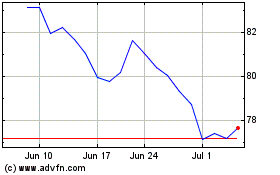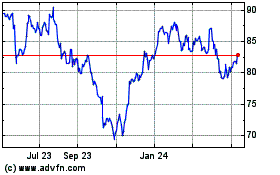Credit Markets: European Bonds Draw In U.S. Companies -- WSJ
January 21 2020 - 3:02AM
Dow Jones News
By Anna Hirtenstein and Pat Minczeski
This article is being republished as part of our daily
reproduction of WSJ.com articles that also appeared in the U.S.
print edition of The Wall Street Journal (January 21, 2020).
U.S. blue-chip companies raised an unprecedented sum in eurozone
debt markets last year, reflecting the region's ultralow interest
rates and global investors' thirst for securities issued by highly
rated companies.
Coca-Cola Co. and International Business Machines Corp. were
among the companies that raised a total of EUR101.7 billion ($113.5
billion) -- a record for nonfinancial company debt -- by selling
corporate bonds denominated in euros in the past year, according to
data from Dealogic. That was more than double the EUR42.2 billion
raised the previous year from selling such debt, known as reverse
Yankee bonds.
Capital markets in Europe have gained growing attention from
corporate borrowers since 2012, as central banks in the region
pushed a number of key benchmark rates to subzero levels. That has
driven down borrowing costs, while leaving fixed-income investors
looking for alternatives to the razor-thin returns offered by
government bonds.
The average yield on euro-denominated nonfinancial corporate
debt is currently 2.38 percentage points lower than on the
U.S.-dollar equivalent, weighted across maturities, according to
data from ICE BofAML indexes.
The low yields and strong investor appetite helped fuel a 38%
increase in the sale of euro-denominated bonds, to EUR450 billion
in 2019, by companies that aren't banks, insurers or other types of
financial firms, according to Dealogic. U.S. businesses dominated
the market, eclipsing Germany to make up nearly a quarter of the
total, as some of the largest and most creditworthy American
companies took advantage of the attractive yields to tap a fresh
group of investors while paring their debt costs.
Investors' interest has escalated further since the European
Central Bank resumed bond repurchases in November, snatching up
even more of the debt on its approved list and leaving investors
looking to other corners of the market for fresh opportunities.
"You even have some companies that have no European operations
still financing in euros and hedging it back," said Thomas Ross, a
fixed-income portfolio manager at Janus Henderson in London.
"They're both benefiting from the ECB and the demand for yield from
investors globally."
Even after factoring in the expense of converting the euros to
dollars, there's a cost advantage of about 15 basis points on
benchmark 10-year bonds for the issuers, according to Thibaut
Cuilliere, head of real asset research and a credit strategist at
French bank Natixis. He estimates that is likely to widen to 25
basis points on average by the end of the year.
In the first two weeks of 2020, U.S. companies including food
manufacturer General Mills Inc. raised EUR1.14 billion from reverse
Yankees, according to data from Dealogic. General Mills, whose
brands include Lucky Charms and Pillsbury, tapped the market for
EUR600 million with a 0.450%-coupon note maturing in 2026.
While American companies in the past have used reverse Yankee
bonds to fund European operations or the acquisition of companies
in the region, more and more businesses on both sides of the
Atlantic are now simply taking the opportunity to refinance their
existing debt at cheaper levels, and for longer periods. The
average maturity for reverse Yankee bonds in 2019 was 8.84 years,
according to Dealogic.
Redemptions -- or early repayments on debt -- will climb 21% to
EUR260 billion in the euro-denominated corporate bond market this
year, according to Natixis.
U.S. companies with investment-grade ratings, rather than
high-yield issuers, have benefited the most from the imbalance
created by the ECB's bond-buying program, which focuses on
lower-risk securities. Companies with lower ratings also tend to be
smaller and less known internationally, hindering their ability to
get favorable treatment from European investors.
"If you're a high-yield name in the U.S., you'd have to spend a
lot of time trying to educate the investor base in Europe if you
come over here, " said Roger Appleyard, head of credit sector
strategy at RBC Capital Markets. "Even in those circumstances, you
might not get cheaper funding than in the States."
The European corporate-bond market is likely to see a slowdown
this year following a pause in mergers and acquisitions during
2019, and as big cash piles deter local businesses from
fundraising, according to Mr. Cuilliere. Still, reverse Yankee
bonds will continue to dominate the market, he forecast.
"Given the high levels of liquidity provided by the central
bank, it means that the spread will stay low for a longer period of
time," Janus Henderson's Mr. Ross said.
Write to Anna Hirtenstein at anna.hirtenstein@wsj.com
(END) Dow Jones Newswires
January 21, 2020 02:47 ET (07:47 GMT)
Copyright (c) 2020 Dow Jones & Company, Inc.
Medtronic (NYSE:MDT)
Historical Stock Chart
From Mar 2024 to Apr 2024

Medtronic (NYSE:MDT)
Historical Stock Chart
From Apr 2023 to Apr 2024
